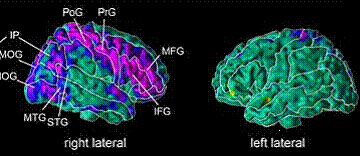A study using functional magnetic resonance imaging (fMRI) shows that expert advice may shut down areas of the brain responsible for decision-making processes, particularly when individuals are trying to evaluate a situation where risk is involved. The study was published in the March 2009 issue of the Public Library of Science (PLOS One).
During times of uncertainty such as an economic recession, many people feel unqualified to sort out the implications of their financial decisions. Often they will seek the advice of a consultant on what choices to make. [continue reading…]
March 2009

(At left): this MRI image depicts where a person at high risk for depression has lost a significant portion of brain tissue in the right lateral cortex of the brain’s right hemisphere (color-coded with purple and blue colors indicating loss of brain tissue), compared to the MRI image (at right) of the left lateral brain which shows no loss of brain matter. Average loss of brain tissue among people at high risk for depression was 30 percent.
Findings from one of the largest-ever imaging studies of depression indicate that a structural difference in the brain – a thinning of the right hemisphere – appears to be linked to a higher risk for depression, according to new research at Columbia University Medical Center and the New York State Psychiatric Institute. [continue reading…]
An interview with John Quelch, Professor, Harvard Business School. In a tough economy, companies can succeed if they understand their customers’ evolving consumption patterns and fine-tune their marketing strategies accordingly.
Source:HarvardBusiness Publishing
Its a tough job – being a parent today. In his new book , CNN commentator Jack Cafferty extols that parenting is in decline.
Now or Never: Getting Down to the Business of Saving Our American DreamI never presumed to have any more answers about being a parent than anybody else.
There are no perfect parents, perfect kids, perfect families — only degrees of dysfunction.
You get up in the morning and do the best you can. At the end of the day you say, “Okay, that wasn’t so bad, let’s try it again tomorrow.” Some of my instincts were pretty good and some of them were awful.
I did stay engaged and didn’t say to hell with being a father when my first marriage ended. With the younger girls, I eventually made the choice to clean up my alcoholism before I pushed things to the point of no return. But most of the credit does to my second wife Carol; to the girls; and to God Almighty. Ultimately, I’ve just been very fortunate.
I don’t know the status of parenting in America. But I know a little about the status of education in America. Parents’ growing inability to impose manners and limits on their kids when the kids are in school is reflected in record dropout rates, as well as teen drug and alcohol abuse, teen sex, and unwed pregnancies. Maybe it’s parenting that’s on the decline, more than the schools. Watch Jack Cafferty talk about “Now or Never” in The Situation Room“
Do you agree? Is parenting on the decline? We would love to hear what you think.
Source: CNN
